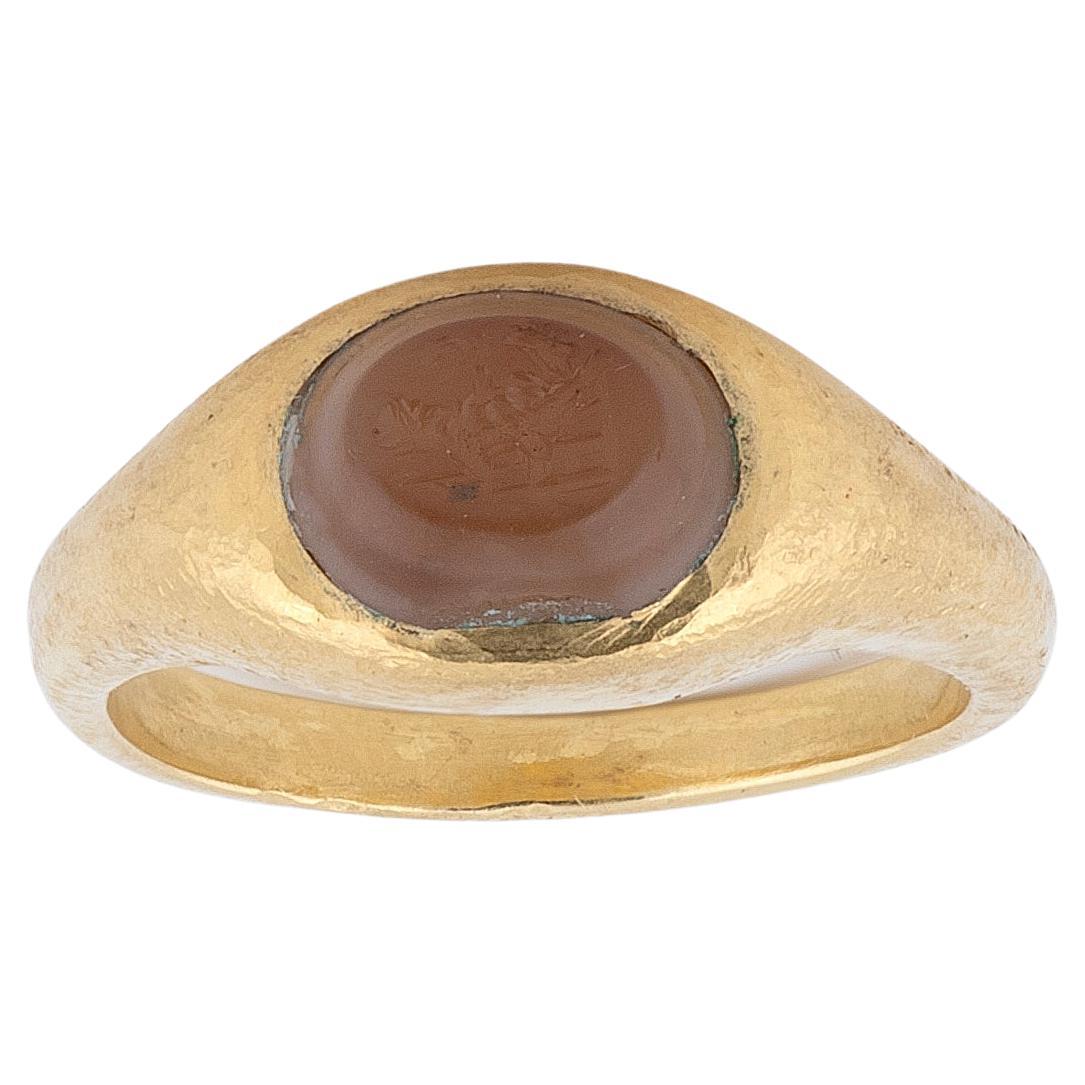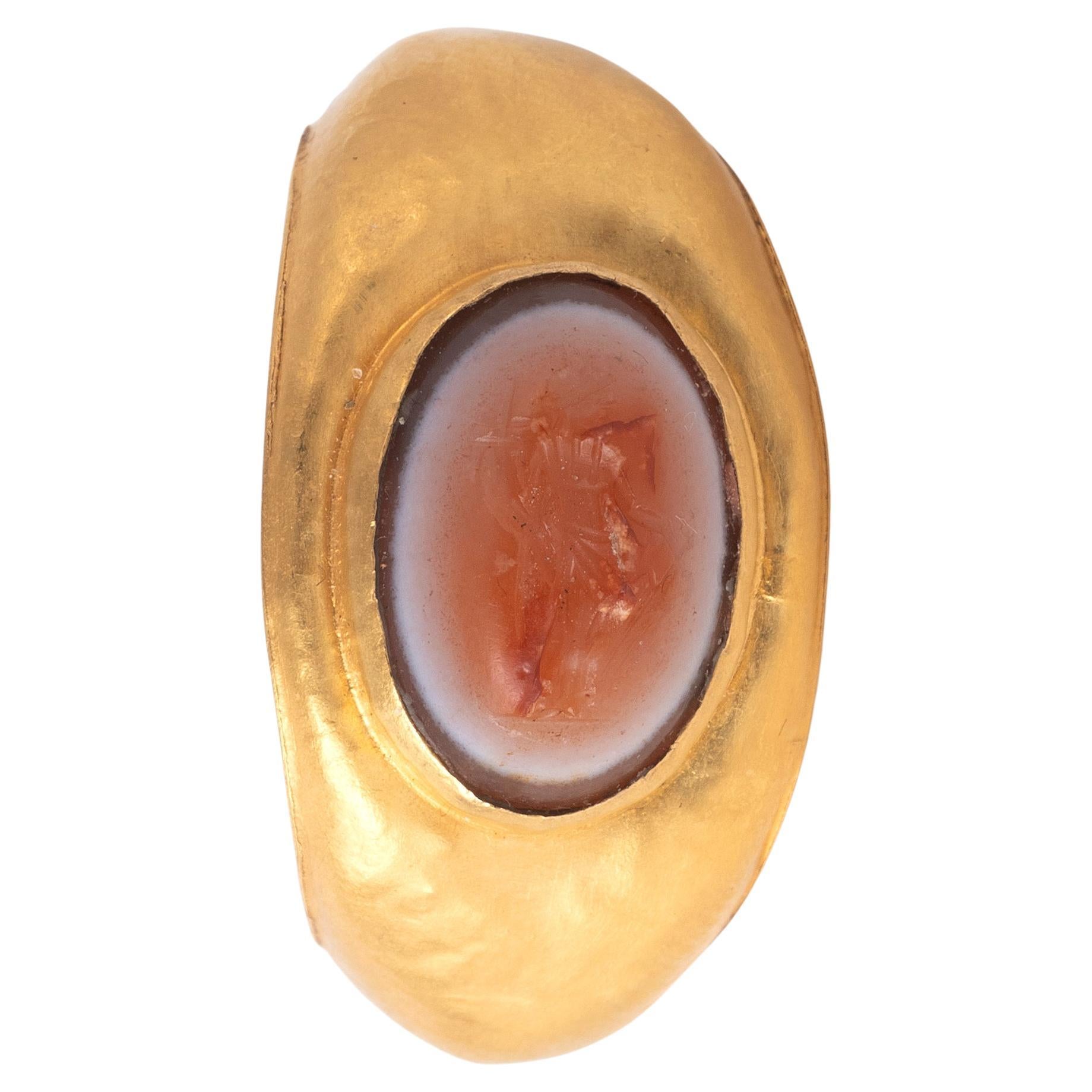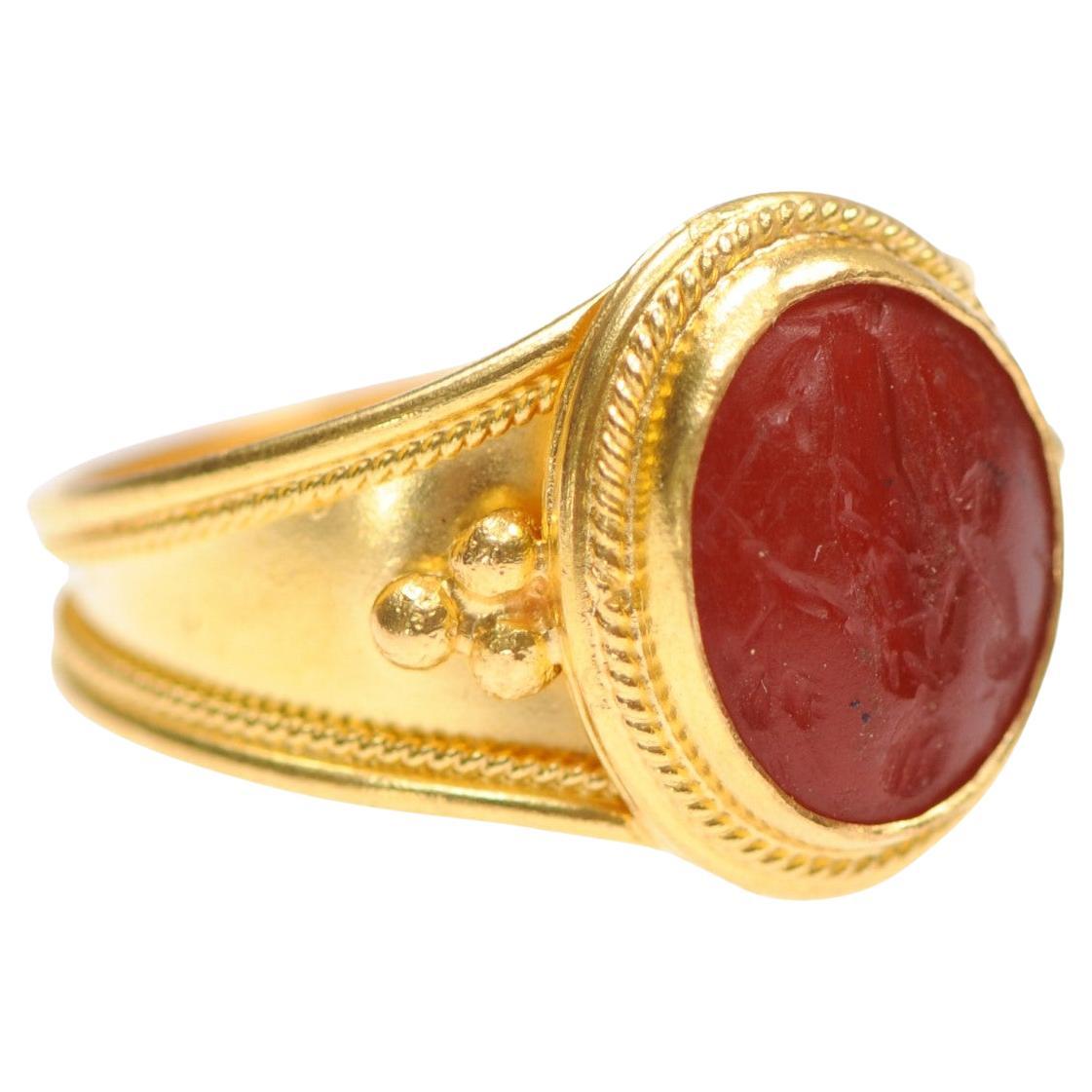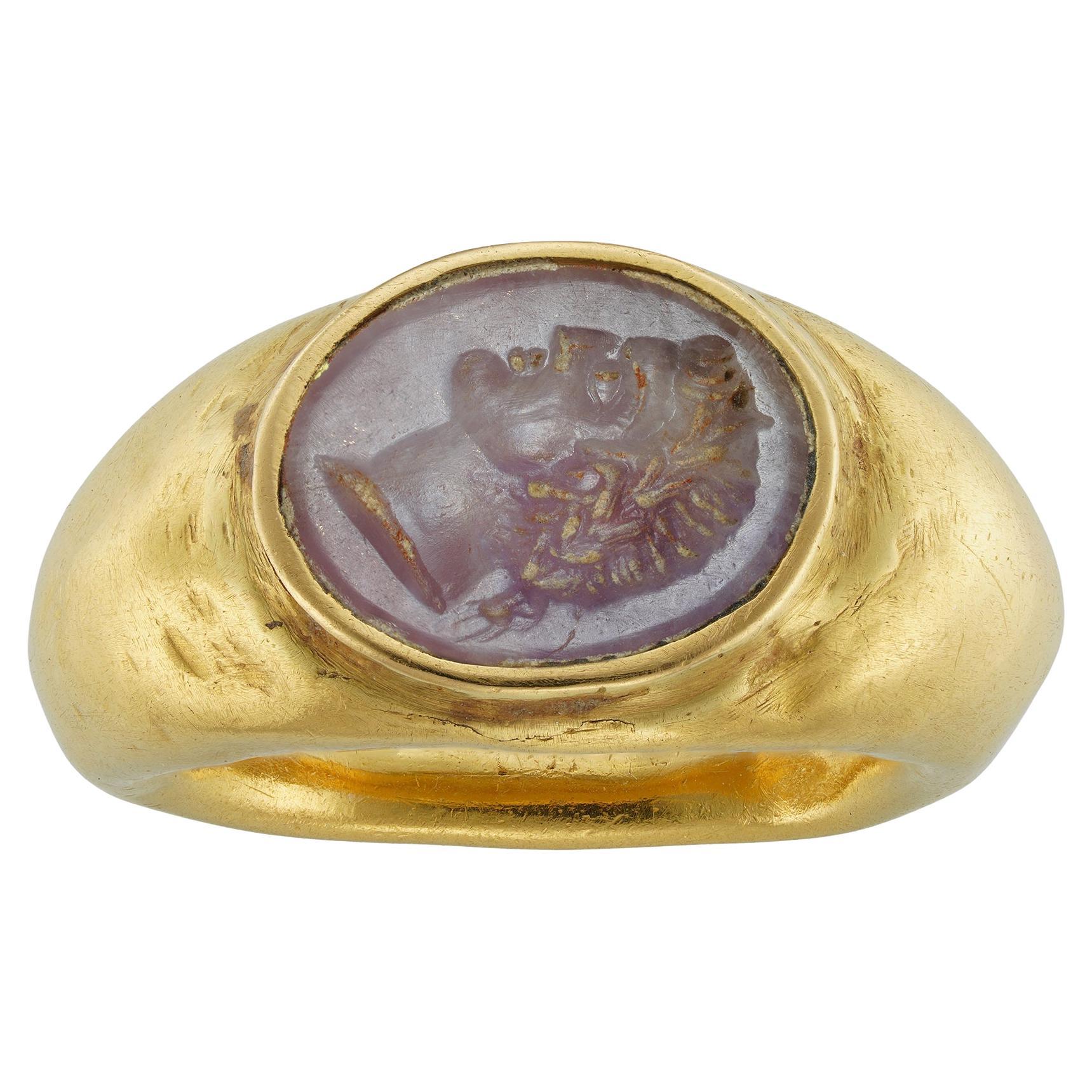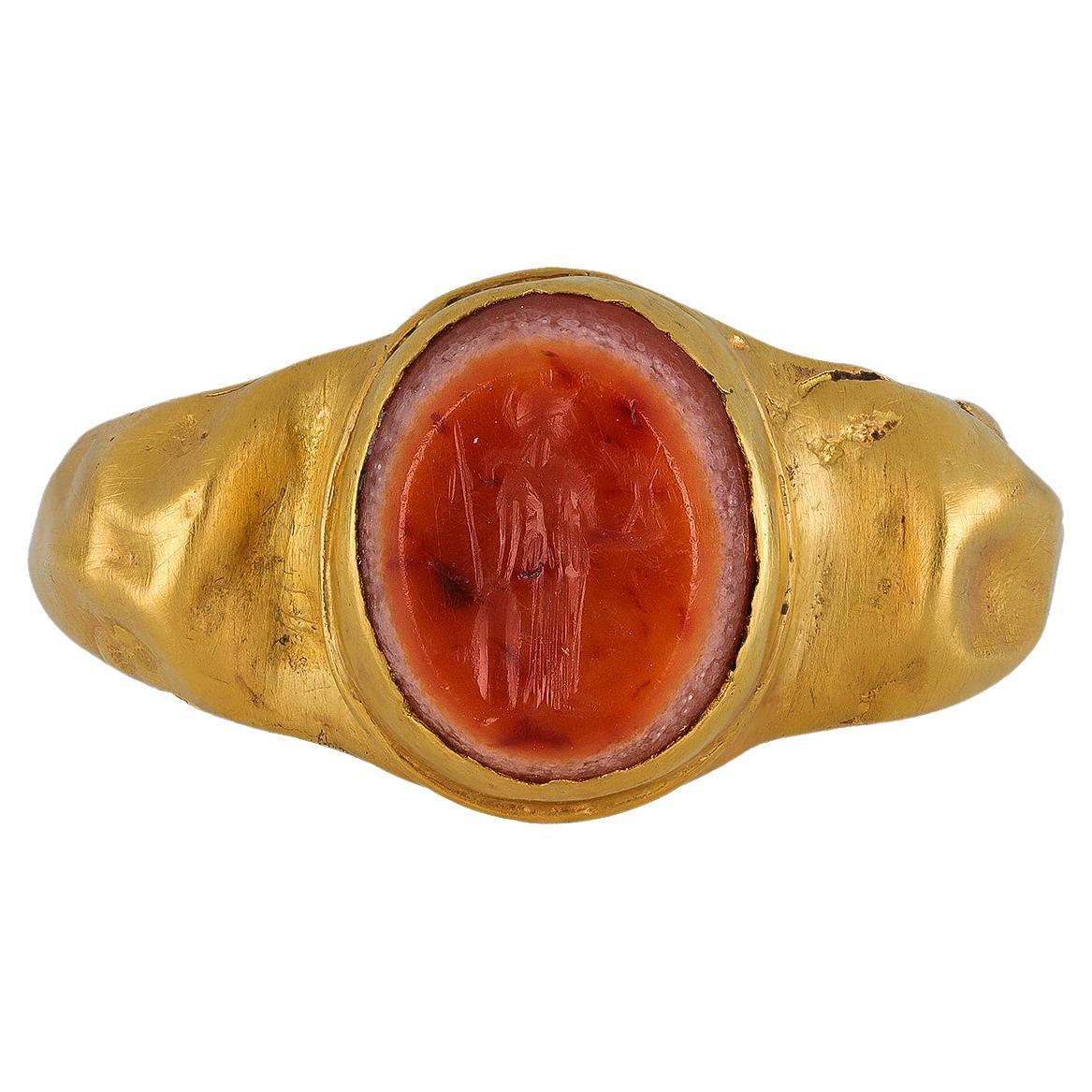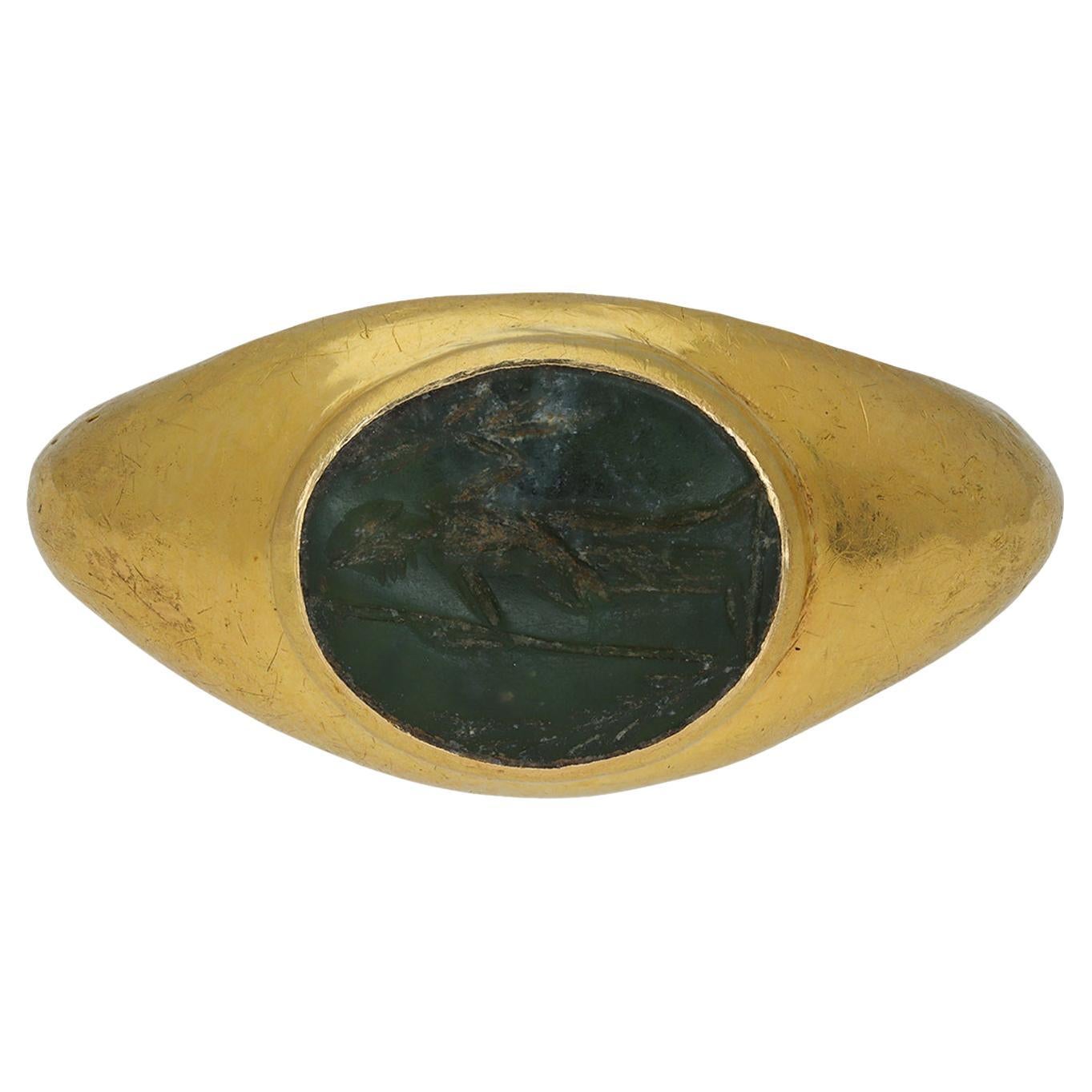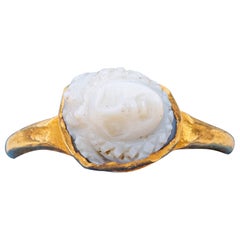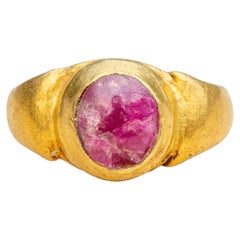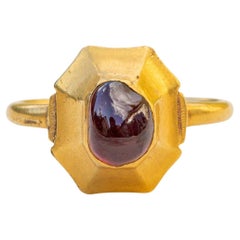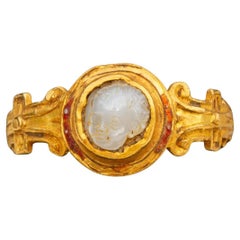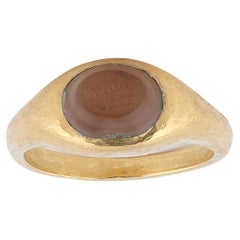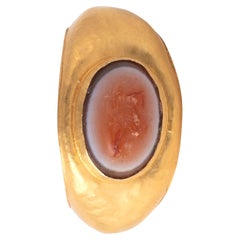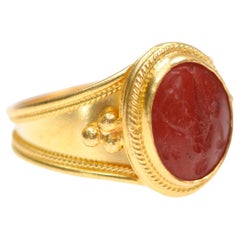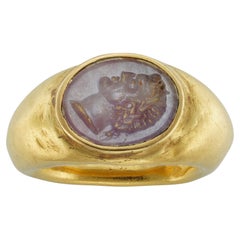Items Similar to Ancient Roman Gold Mens Signet Ring Conical Intaglio Ring Gem Carving
Want more images or videos?
Request additional images or videos from the seller
1 of 16
Ancient Roman Gold Mens Signet Ring Conical Intaglio Ring Gem Carving
$8,176.08
£6,000
€7,071.61
CA$11,252.62
A$12,542.21
CHF 6,580.47
MX$153,160.86
NOK 83,323.04
SEK 78,752.95
DKK 52,778.47
About the Item
A superb ancient Roman agate intaglio ring. The high-karat gold signet ring is set with an engraved gemstone, known as an ‘intaglio’. It dates from between the 2nd to 3rd century AD and is a fine example of a Romano-British intaglio.
The conical-shaped agate gemstone displays various bands of colour ranging from honey brown to greyish-blue. The engraving depicts the bust of a man wearing a helmet, possibly winged which would depict Mercury, the Roman god of commerce, financial gain and communication. In Roman times, people would wear rings with the intaglio of Mercury in hope that the he would protect them and bless them with good financial fortune in their lives.
A number of referenced examples of similar ancient Roman conical shaped intaglios reside in notable museums all across the world, from the British Museum to the Louvre. A page with these examples and their sources can be found in the final photos of the listing. Similar examples can also be found in the extensive Alice and Louis Koch collection (items: 234, 235, 241, 301). Again see final images for reference.
The gold ring mount is of D-shaped cross-section and a hollow 22K gold construction. The ring has a fantastic smooth silk-like texture when worn. It remains in good overall condition and the intaglio is very secure in the mount. The gold mount dates to the late 18th to early 19th century, and the shape is inspired by ancient Roman ring mounts. During this period, many ancient intaglios were collected and repurposed into jewellery, forming some of the most notable intaglio collections that exist today.
UK size O 1/2, US size 7.5
The ring weighs 4.15 grams. The gold ring is unmarked but tests as 22K gold.
A truly remarkable survivor, this ring would be an excellent addition to any collection or for anyone looking to wear a tangible piece of history!
The ancient Romans considered jewellery to be an essential dressing accessory, for it provided a public display of their wealth. The custom of wearing rings was probably introduced by the Sabines, who are described in early legends as wearing gold rings with precious stones. During the Roman Republic it became customary for all the senators, chief magistrates, and at last for the equites also, to wear gold rings.
- Ring Size:7.5 US, Not Resizable
- Metal:
- Stone:
- Stone Cut:
- Weight:4.15 g
- Period:
- Date of Manufacture:Unknown
- Condition:
- Seller Location:London, GB
- Reference Number:Seller: 100761stDibs: LU2845224962312
About the Seller
5.0
Vetted Professional Seller
Every seller passes strict standards for authenticity and reliability
Established in 2019
1stDibs seller since 2022
46 sales on 1stDibs
- ShippingRetrieving quote...Shipping from: London, United Kingdom
- Return Policy
Authenticity Guarantee
In the unlikely event there’s an issue with an item’s authenticity, contact us within 1 year for a full refund. DetailsMoney-Back Guarantee
If your item is not as described, is damaged in transit, or does not arrive, contact us within 7 days for a full refund. Details24-Hour Cancellation
You have a 24-hour grace period in which to reconsider your purchase, with no questions asked.Vetted Professional Sellers
Our world-class sellers must adhere to strict standards for service and quality, maintaining the integrity of our listings.Price-Match Guarantee
If you find that a seller listed the same item for a lower price elsewhere, we’ll match it.Trusted Global Delivery
Our best-in-class carrier network provides specialized shipping options worldwide, including custom delivery.More From This Seller
View AllSmall Ancient Roman Medusa Carved Cameo Gold Ring 2nd Century Gem Carving
Located in London, GB
A scarce and small ancient Roman gold Medusa cameo ring, circa 2nd to 3rd century AD.
The carved layered onyx gemstone is white in colour and depicts the bust of Medusa engraved wit...
Category
Antique 15th Century and Earlier Italian Classical Roman Signet Rings
Materials
Onyx, Gold
Ancient Javanese Gold Ring with Ruby Cabochon Java Indonesian Antique Solitaire
Located in London, GB
A scarce early Javanese gold and ruby ring dating from the 7th-15th century Indonesian Classical period.
As expected with Javanese gem-set gold rings m...
Category
Antique 15th Century and Earlier Javanese Signet Rings
Materials
Ruby, Gold
Scarce Medieval Gold Garnet Ring Antique 13th Century Talisman Signet Ring
Located in London, GB
An exceptionally rare late 13th century Medieval period gold ring, made either France or England, circa 1280!
This Medieval high-karat gold ring is set with a large 11ct irregular-s...
Category
Antique 15th Century and Earlier European Engagement Rings
Materials
Garnet, 22k Gold
Rare Elizabethan 16th Century Gold Cupid Ring Renaissance Gold Ring Womens
Located in London, GB
This exquisite Elizabethan gold ring dates to the mid-16th century (c.1570) and features a circular bezel set with a high-relief cameo of Cupid, delicately carved in white chalcedony...
Category
Antique 16th Century Italian Renaissance Engagement Rings
Materials
Chalcedony, 22k Gold
Ancient Gold Amethyst Engraved Scorpion Ring Early Javanese Intaglio Ring
Located in London, GB
This scarce gold intaglio ring dates to the Indonesian Classical period, circa 8th–10th century.
The ring is crafted from high-karat gold (22K), featuring a circular bezel that holds an amethyst gemstone engraved with a scorpion motif. Scorpions were often considered symbols of protection in ancient traditions, aligning with Javanese beliefs that rings possessed magical properties to bring good fortune and guard against harm.
The stirrup-shaped shoulders, designed to mimic the form of water buffalo horns, are a hallmark of early Javanese craftsmanship. This distinctive design reflects both artistic expression and cultural symbolism rooted in Java’s agricultural and spiritual traditions.
Java, one of Indonesia’s largest islands, was a significant centre of civilisation and artistry during this period. Gold rings were not merely decorative but also served as currency, payment for fines, dowries, and even wedding feasts. Imported gemstones, like the present amethyst, were chosen for their astrological, magical, and medicinal properties, further enhancing their importance in Javanese society.
Referenced Examples:
Similar rings can be found in the Metropolitan Museum of Art (Accession No. 1998.544.298).
Additional examples are catalogued in Java Gold...
Category
Antique 15th Century and Earlier Engagement Rings
Materials
Amethyst, 22k Gold
Small Ancient Indus Valley Bead Ring Etched Carnelian Cone Antique Gold Ring
Located in London, GB
A superb and rare ancient Indus Valley etched carnelian bead ring. The conical shaped carnelian gemstone in the centre dates from the middle of the third millennium BC. Deep orange in colour with white patterned etchings, these beads originate from the Indus Valley civilisation (parts of modern day Pakistan and India).
These carnelian beads were alkaline-bleached to develop the geometric white patterns visible on the exterior. The technique was first developed by the Harappans of the Indus Valley civilisation, and vast quantities have been found in archaeological sites all across the Indus Valley.
The conical stone has been set in a later high-karat gold ring mount, the hoop is hollow and of circular cross section which widens towards the bezel. This design and shape is typical of ancient gold rings...
Category
Antique 18th Century Indian Signet Rings
Materials
Carnelian, Gold
You May Also Like
Ancient Roman Gold Mens Signet Ring Conical Intaglio Ring Gem Carving Jupiter
Located in Firenze, IT
A superb ancient Roman agate intaglio ring. The high-karat gold signet ring is set with an engraved gemstone, known as an ‘intaglio’. It dates from between the 2nd to 3rd century AD ...
Category
Antique 15th Century and Earlier Italian Classical Roman Signet Rings
Materials
Agate, 18k Gold, Yellow Gold
Roman Hollow Intaglio Ring circa 3rd century
Located in Firenze, IT
Period: III century
Ring size: 8 ½
Weight: 5,61 gr
L’intaglio di epoca romana, ascrivibile al III secolo circa, è realizzato in agata e oro. Al centro si scorge l’incisione della de...
Category
Antique 15th Century and Earlier Italian Classical Roman Signet Rings
Materials
Carnelian, Gold, 22k Gold, Yellow Gold
18K Gold Ring w Venus Intaglio
Located in Atlanta, GA
A hand crafted 21 karat gold ring made with an authentic Carnelian intaglio representing Venus (or Aphrodite, as she was called during the time it w...
Category
Antique 15th Century and Earlier European Classical Greek Signet Rings
Materials
Chalcedony, Gold
A Roman intaglio gold hardstone ring
Located in London, GB
A Roman intaglio gold hardstone ring, the oval shaped rose-quartz measuring 1.4 x 1.1cm, deep engraved with the profile of an Emperor wearing a laurel w...
Category
Antique 15th Century and Earlier European Classical Roman Dome Rings
Materials
22k Gold
Ancient Roman gold ring with agate intaglio of Minerva, circa 2nd - 3rd century
Located in London, GB
Ancient Roman gold ring with agate intaglio of Minerva. Set with an oval banded agate intaglio to centre of the standing goddess Minerva with long robes and helmet, holding a winged statue...
Category
Antique 15th Century and Earlier Classical Roman Signet Rings
Ancient Roman Gold Ring with Minerva Intaglio, 3rd-4th Century AD
Located in London, GB
Ancient Roman gold ring with Minerva intaglio. Set to centre with an oval hardstone intaglio in a closed back roman set setting, finely engraved with an image of the goddess of wisdom and war, Minerva, who is depicted wearing a helmet and holding a spear and olive branch in a signet ring design featuring a finely raised border and closed backholing, leading to broad trumpeting shoulders which taper to a solid shank. Tested yellow gold, approximately 15.99 grams in weight, circa 3rd-4th century AD.
Minerva was the virgin goddess of music...
Category
Antique 15th Century and Earlier Signet Rings
Materials
Gold
More Ways To Browse
Mens Roman Ring
Mens Gold Cross
18th Century Mens Ring
Mercury Intaglio
Sapphire Intaglio Ring
Flush Set Diamond Signet Ring
French Antique Mens Rings
Italian Mens Signet Rings
Lion Ring Mens Gold
Amethyst Intaglio
Art Nouveau Mens Ring
Heart Signet Ring Tiffany
Intaglio Ring Georgian
Intaglio Wax Seal
Mens Lapis Ring
Mens Rings Lapis Lazuli
Antique Sardonyx Ring
Chinese Signet Ring
